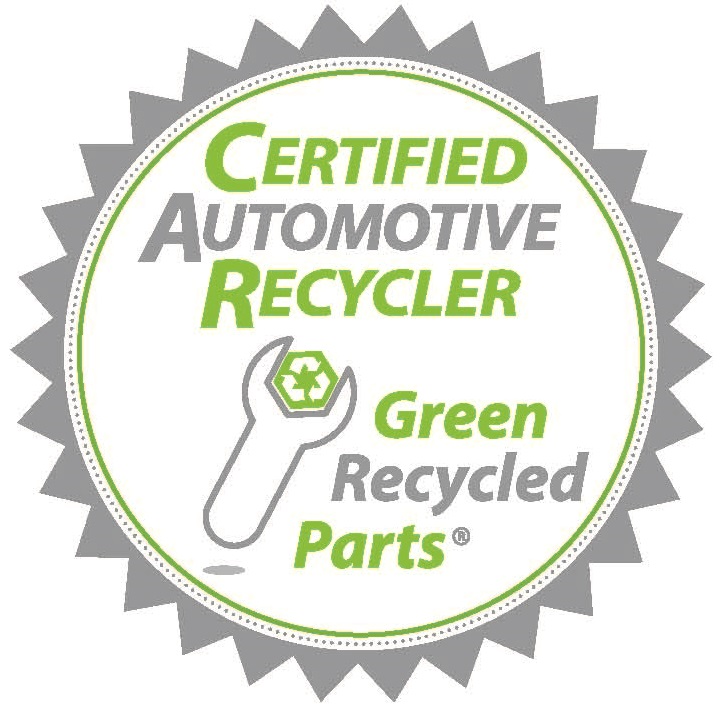All automotive fluids must be properly removed and managed as part of the dismantling procedure and/or prior to crushing the vehicles. Evacuated fluids include fuel, used oils and antifreeze.
Vehicle dismantling can result in spills and leaks as fluid-containing parts are removed. Vehicle crushing may also release any remaining fluids. Proper management includes draining parts, controlling any leaks and spills, and recycling, reusing, or disposing of the fluids.
The fluid evacuation process at a salvage yard generates the most problematic wastes of any automotive recycling activity. All fluids, whether they are waste or reusable product, pose certain risks if introduced to the environment. Proper handling, storage and disposal of automotive fluids such as fuel, antifreeze and used oil, which includes transmission, brake and other fluids, is key to minimizing exposure to the environment.
Properly remove the following fluids from the vehicle during the dismantling operation:
• Used Oils including transmission fluid and brake fluid
Used Oils including transmission fluid and brake fluid
• Fuel
Fuel
• Antifreeze
Antifreeze
• Wiper fluid
Wiper fluid
Keeping waste types segregated is the best means to compliance and the least expensive way to dispose of the waste. Most regulations pertain to the storage and disposal of wastes. Many automotive wastes have been exempt from more stringent regulation to encourage recycling and to streamline the management of commonly generated wastes.
Used Oil
Used oils, including crank case motor oil and brake, transmission, power steering, rear axle housing and hydraulic fluids, must be managed according to the used oil management standards.
Used oil that has not been mixed with hazardous waste is exempt from hazardous waste regulation provided it is recycled or burned for energy recovery. The use of used oil or oily waste for dust suppression purposes is specifically banned.
On-Site Storage of used oil must meet the following standards:
1) Containers and storage tanks must be in good condition.
Containers and storage tanks must be in good condition.
2) Containers must be clearly marked “Used Oil.”
Containers must be clearly marked “Used Oil.”
3) Fill pipes for underground used oil storage must be clearly marked “Used Oil.”
Fill pipes for underground used oil storage must be clearly marked “Used Oil.”
A used oil generator is the original producer of the used oil. Recycling options for generators of used oil include the following:
1) Provide used oil to a marketer, in this case the generator is not required to test for used oil fuel specifications.
Provide used oil to a marketer, in this case the generator is not required to test for used oil fuel specifications.
2) Self-transport in quantities of 55 gallons or less to a state-recognized used oil collection center.
Self-transport in quantities of 55 gallons or less to a state-recognized used oil collection center.
3) Provide used oil directly to a burner, in this case the generator or the burner becomes a marketer and must test for specification parameters.
Provide used oil directly to a burner, in this case the generator or the burner becomes a marketer and must test for specification parameters.
4) Burn used oil on site in a used oil furnace (or boiler) provided that:
Burn used oil on site in a used oil furnace (or boiler) provided that:
a) Oil is generated on site or collected from Do-It-Yourselfers.
Oil is generated on site or collected from Do-It-Yourselfers.
b) The furnace has a maximum capacity of no more than 0.5 million BTU/hr.
The furnace has a maximum capacity of no more than 0.5 million BTU/hr.
c) The furnace is vented to the outside.
The furnace is vented to the outside.
Facilities with oil storage capacity of 1320 gallons or more (in containers 55 gallons or larger) are required to prepare and implement a Spill Prevention Control and Countermeasures (SPCC) plan to ensure that the appropriate measures have been taken to reduce the risk of oil reaching navigable waters in the event of spill.
Generally, used oil generators that reap the benefit of burning used oil in an approved used oil-fired furnace will need an SPCC plan because the summertime accumulation of oil will require an on-site storage capacity greater than 1320 gallons for all petroleum products including new and used oils, gasoline, diesel and petroleum-based solvent in 55-gallon drums or larger tanks.
Automotive salvage facilities that do not recover the energy of the used oil on-site will benefit from reducing "tankage" or storage capacity of petroleum products to less than 1320 gallons to minimize the impact of potential spills and avoid needing to maintain an SPCC plan.
Spill Prevention Control and Countermeasure (SPCC)
Facilities with oil storage capacity of 1320 gallons or more are required to prepare and implement a Spill Prevention Control and Countermeasures (SPCC) plan to ensure that the appropriate measures have been taken to reduce the risk of oil reaching navigable waters in the event of spill.
Title 40, Section 112 of the Code of Federal Regulations (CFR) requires a Spill Prevention Control and Countermeasures (SPCC) plan for facilities with total aboveground petroleum product storage (i.e., new oil, used oil and fuel) capacity in excess of 1,320 gallons (container with volume of 55 gallons or more only). SPCC plans are designed to minimize the potential for a petroleum release to occur and mitigate any environmental impacts in the event one does occur.
Spills
In Iowa, Section 304 Emergency Release Notification is coordinated through the Department of Natural Resources Emergency Response and Homeland Security Unit. Section 304 notification at the federal level is made through the National Response Center at (800) 424-8802. Federal requirements for reporting are based on reportable quantities as listed in EPA's List of Lists.
Iowa does not utilize reportable quantities, instead determining whether each incident creates a "hazardous condition" based on risk to human health and safety, property and the environment.
If a hazardous substance spill meets any of the following guidelines it must be reported to the Department of Natural Resources Emergency Response Unit at (515) 281-8694.
• The hazardous substance has the potential to leave the property by run-off, sewers, tile lines, culverts, drains, utility lines or some other conduit.
The hazardous substance has the potential to leave the property by run-off, sewers, tile lines, culverts, drains, utility lines or some other conduit.
• The hazardous substance has the potential to reach a water of the state - either surface water or groundwater.
The hazardous substance has the potential to reach a water of the state - either surface water or groundwater.
• The hazardous substance can be detected in the air at the boundaries of the facility property by the senses (sight and smell) or by monitoring equipment. There is a potential threat to the public health and safety.
The hazardous substance can be detected in the air at the boundaries of the facility property by the senses (sight and smell) or by monitoring equipment. There is a potential threat to the public health and safety.
• Local officials respond to the incident.
Local officials respond to the incident.
• The release exceeds a Federal Reportable Quantity (RQ).
The release exceeds a Federal Reportable Quantity (RQ).
Motor oil that is sold as a retail product is a Household Hazardous Materials (HHM) that requires the display of signage under the permit rules. Every Iowa business that sells HHM is required to obtain/maintain an HHM Permit.
Retailers selling motor oil are required to accept used oil from the public for recycling/reuse or post a sign indicating the name and address of the nearest location where the public can take used oil for recycling or reuse. The sign must also state that it is unlawful to dispose of used oil in a sanitary landfill. Used oil collection locations are available in the Iowa Automotive Directory. Salvage yards that take used oil from the public can be listed in this directory.
Salvage yards that do not sell but do accept used oil from Do-it-yourselfers (including farmers generating less than 25 gallons per month) may wish to display the used oil signage in recognition of the community service they provide. For additional information on the collection of used oil from the public see 567- Chapter 119 of the Iowa Administrative Code or contact the DNR.  Iowa DNR Used Oil signage for HHM Permit compliance can be downloaded from the Iowa DNR website at http://www.iowadnr.com/waste/hhm/files/oil_sign.pdf.
Iowa DNR Used Oil signage for HHM Permit compliance can be downloaded from the Iowa DNR website at http://www.iowadnr.com/waste/hhm/files/oil_sign.pdf.
ECAR Fact Sheet Puerto Rico USED OIL
Fact Sheet Status and Disclaimer
The following compliance assistance information for the state is subject to all of the warranties and disclaimers associated with this internet website [Read full disclaimer]. Please note that this information has been submitted or will be submitted to the state agencies responsible for implementing environmental laws and regulations for their review and comment. This note is provided only for your informational purposes and does not change or alter any warranties or disclaimers, including, for example, your responsibility to seek appropriate legal or technical assistance to interpret the state's laws as needed.
The fact sheets are designed to assist automotive recyclers with operating their businesses and managing their wastes in compliance with the environmental laws in Iowa. ECAR tries to provides timely and essential information on this topic, but be aware that other items, such as local regulations and recent changes, may apply. Read the Disclaimer. To view other Puerto Rico FACT SHEETS return to the ECAR Virtual Tour.



